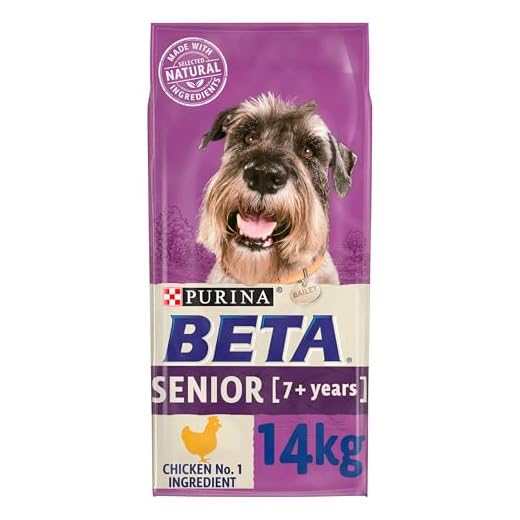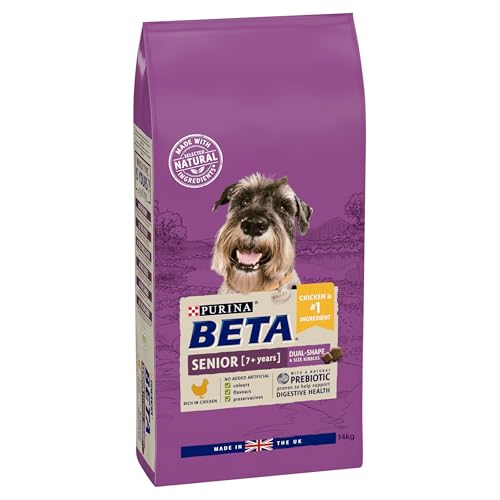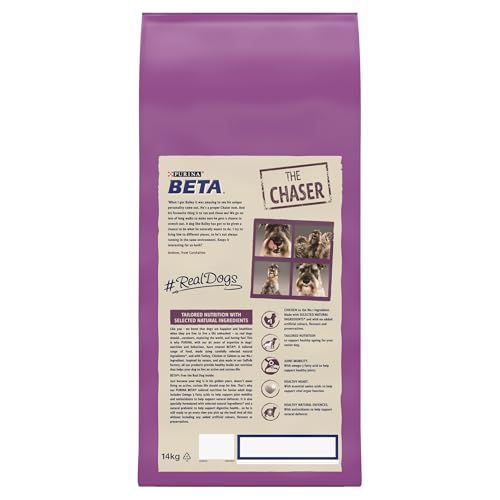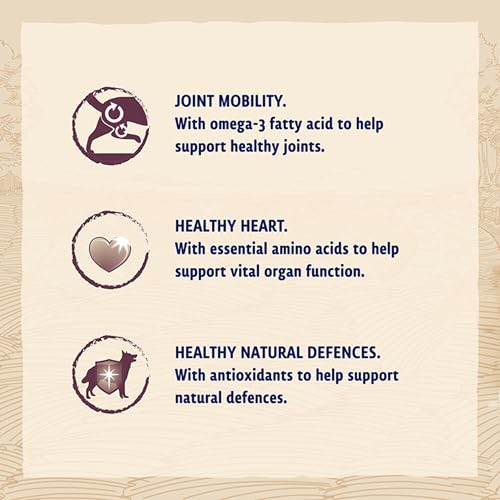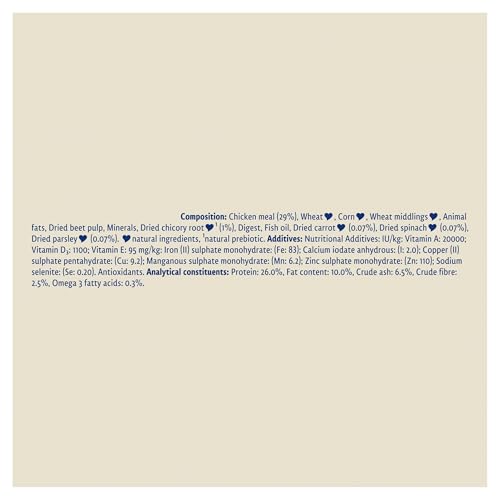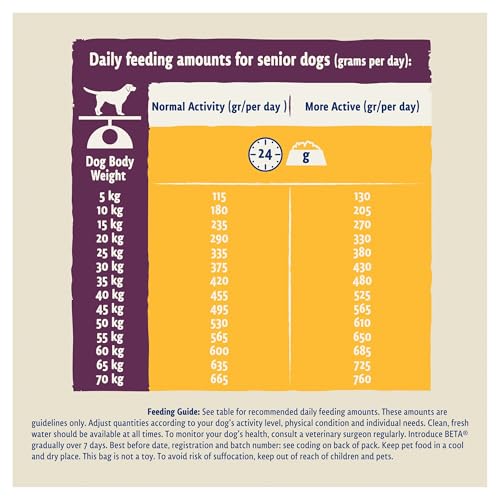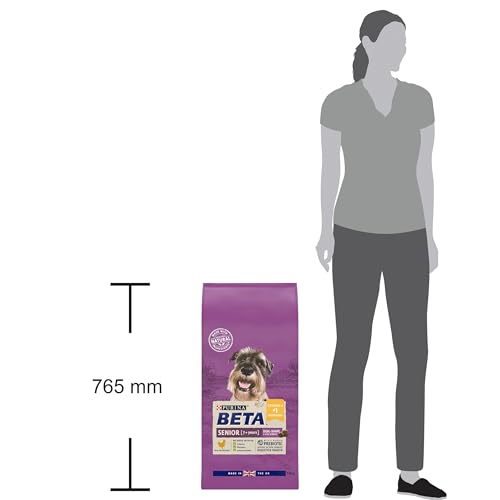




When my beloved senior dog was diagnosed with an enlarged heart, I was overwhelmed with concern and questions. How could I ensure his remaining years were comfortable and happy? One of the most crucial aspects I had to address was his diet. Finding the right food for a senior dog with an enlarged heart is essential in managing the condition and promoting overall well-being.
Heart disease in dogs, particularly as they age, requires a specialised approach to nutrition. A diet low in sodium but rich in essential nutrients can make a significant difference in managing symptoms and improving quality of life. I spent countless hours researching and consulting with veterinarians to find the best dietary options for my furry companion.
In this article, I will share the insights and recommendations I discovered on my journey. From the specific nutrients that support heart health to the best commercial dog food brands catering to senior dogs with heart issues, my aim is to provide a comprehensive guide. Whether you’re facing this challenge for the first time or looking to refine your dog’s diet, I hope my experiences can offer you some clarity and direction.
Choosing the Ideal Diet for a Senior Dog with an Enlarged Heart
As a pet owner, it’s heart-wrenching to see your senior dog struggling with health issues like an enlarged heart. Ensuring their diet supports their condition is crucial. When my dog was diagnosed, I knew I had to find the best possible food to help manage his heart condition while still providing all the necessary nutrients for his ageing body.
Through extensive research and consultations with our vet, I discovered several key components that a heart-healthy diet should include. These foods not only support cardiac function but also help maintain overall health and vitality. Let me share some insights that may help you choose the best diet for your beloved senior dog.
Key Components of a Heart-Healthy Diet for Senior Dogs
- Low Sodium: Reducing sodium intake is critical for dogs with heart issues. It helps prevent fluid retention and reduces the workload on the heart. Look for brands that explicitly state they have low sodium content.
- High-Quality Protein: Senior dogs still need adequate protein to maintain muscle mass, but it’s important that the protein source is lean and of high quality. Fish, chicken, and turkey are excellent options.
- Omega-3 Fatty Acids: These essential fats, often found in fish oil, have anti-inflammatory properties that can benefit heart health. Omega-3s help reduce the risk of arrhythmias and lower blood pressure.
- Taurine and L-Carnitine: These amino acids are crucial for heart function. Taurine is known to support heart muscle function, while L-Carnitine helps in the production of energy necessary for cellular function.
- Antioxidants: Vitamins E and C, along with other antioxidants, support overall heart health by protecting cells from damage. Look for foods fortified with these nutrients.
In addition to choosing the right food, it’s important to consult with your vet regularly to monitor your dog’s heart condition and adjust their diet as needed. By providing a diet tailored to their specific health needs, you can help improve your senior dog’s quality of life and ensure they stay with you for as long as possible.
Understanding the Nutritional Needs of Senior Dogs with Enlarged Hearts
As our dogs age, their nutritional needs change, especially if they have specific health conditions like an enlarged heart. This condition, also known as cardiomegaly, requires careful dietary management to ensure that our furry companions maintain optimal health and quality of life.
When feeding a senior dog with an enlarged heart, it is crucial to focus on heart-friendly nutrients while avoiding ingredients that can exacerbate the condition. Tailoring their diet to support cardiac health can make a significant difference in managing their symptoms and overall well-being.
Key Nutritional Considerations
- Low Sodium Levels: Excessive sodium can lead to fluid retention, which puts additional strain on the heart. Choosing low-sodium dog food can help manage this risk and reduce the workload on your dog’s heart.
- High-Quality Protein: While senior dogs need protein to maintain muscle mass, it’s important that the protein comes from high-quality sources. This ensures they get the necessary amino acids without additional stress on their kidneys.
- Omega-3 Fatty Acids: These essential fats have anti-inflammatory properties and can help improve heart health. Foods rich in omega-3, such as fish oil, can support cardiovascular function.
- Taurine and L-Carnitine: These amino acids are critical for heart health. Taurine supports cardiac muscle function, and L-carnitine helps with energy production in heart cells. Including these in your dog’s diet can be beneficial.
- Antioxidants: Vitamins such as E and C, along with other antioxidants, can help reduce oxidative stress on the heart. These nutrients protect the heart cells from damage and support overall cardiac health.
In addition to these specific nutrients, it’s also essential to consider the overall caloric intake and weight management for senior dogs with heart conditions. Maintaining a healthy weight can prevent additional strain on the heart and improve your dog’s quality of life.
Regular consultations with your veterinarian can ensure that your dog’s dietary needs are being met and adjusted as necessary based on their health status. By focusing on these nutritional aspects, we can provide our senior dogs with the support they need to live healthier, happier lives despite their heart condition.
Essential Ingredients for Canine Heart Health
When choosing food for a senior dog with an enlarged heart, it is crucial to focus on specific ingredients that support cardiovascular function. Nutrient-dense and balanced diets can significantly impact a dog’s heart health, potentially slowing the progression of heart disease.
I always prioritise foods that contain high-quality proteins, beneficial fatty acids, and specific vitamins and minerals. These components play a critical role in maintaining heart function and overall health in senior dogs.
Key Ingredients to Include
-
Taurine: This amino acid is vital for cardiac function. Taurine deficiencies have been linked to heart issues in dogs, so ensuring their food includes taurine is essential for maintaining a healthy heart.
-
Omega-3 Fatty Acids: Ingredients rich in omega-3s, like fish oil, support heart health by reducing inflammation and improving blood circulation. Omega-3 fatty acids are known for their ability to lower the risk of arrhythmias and reduce triglycerides.
-
Coenzyme Q10: This antioxidant aids in energy production within cells and supports heart muscle function. Including coenzyme Q10 can help in maintaining a dog’s energy levels and overall heart health.
-
L-Carnitine: This nutrient is important for fat metabolism and energy production in heart cells. Foods supplemented with L-carnitine can help in managing heart conditions by ensuring efficient heart function.
-
Low Sodium Levels: Managing sodium intake is crucial for dogs with heart issues. High sodium can exacerbate heart conditions by increasing blood pressure and fluid retention, so it’s essential to choose foods with low sodium content.
By focusing on these specific ingredients, you can provide your senior dog with a diet that supports heart health and overall well-being. Always consult with a veterinarian to tailor the diet to your dog’s specific needs and conditions.
The Importance of Low-Sodium Dog Food for Cardiac Support
As our dogs age, their health needs change, and one of the most critical adjustments we can make is in their diet. For senior dogs, particularly those with heart conditions like an enlarged heart, nutrition plays a pivotal role in managing their health. One key aspect to consider is the sodium content in their food.
High sodium levels can exacerbate heart problems by causing fluid retention, which in turn increases the workload on an already struggling heart. Therefore, selecting a diet that is specifically formulated to be low in sodium can help manage these symptoms and improve the quality of life for our senior dogs.
Benefits of Low-Sodium Diet for Dogs with Heart Conditions
Feeding a senior dog with an enlarged heart a low-sodium diet can provide several significant benefits. Firstly, it helps to reduce fluid accumulation in the body, easing the burden on the heart. This is crucial in preventing further complications and ensuring that the heart can function more efficiently.
Reduction in Fluid Retention:By lowering the sodium intake, we can help prevent the build-up of excess fluid in the body. This is particularly important for dogs with heart issues, as fluid retention can lead to increased blood pressure and exacerbate heart failure symptoms.
Enhanced Heart Function:A diet low in sodium supports better cardiovascular health by decreasing the volume of blood the heart has to pump. This reduction in workload can help to maintain a more stable heart function, slowing down the progression of heart disease.
Improved Quality of Life:Ultimately, a low-sodium diet can contribute to a better overall quality of life for senior dogs. By managing symptoms more effectively, dogs are more likely to remain active and comfortable.
- Monitor Ingredients: Always check the labels for sodium content and choose foods designed for heart health.
- Consult with Your Vet: Regular consultations with your veterinarian are essential to tailor the diet to your dog’s specific needs.
- Consistency is Key: Maintain a consistent diet to help manage heart health over the long term.
In conclusion, paying attention to the sodium levels in your senior dog’s diet is a simple yet highly effective way to support their heart health. With careful management and the right nutritional choices, you can help your furry friend enjoy their golden years with greater ease and comfort.
Grain-Free vs. Grain-Inclusive: Which is Better for Heart Health?
As a dog owner with a senior canine companion who has an enlarged heart, choosing the right diet is crucial for maintaining their health. One of the most debated topics in dog nutrition is whether grain-free or grain-inclusive diets are better for heart health. With varying opinions and research findings, it can be challenging to make an informed decision.
Grain-free diets became popular due to concerns about grains causing allergies and sensitivities in dogs. However, recent studies have raised concerns about the potential link between grain-free diets and canine dilated cardiomyopathy (DCM), a serious heart condition. This connection is still under investigation, but it highlights the importance of scrutinising dietary choices carefully.
The Case for Grain-Inclusive Diets
Grain-inclusive diets incorporate grains such as rice, barley, and oats, which can provide essential nutrients and fibre. These grains are a good source of energy and can aid in digestion. For senior dogs with an enlarged heart, maintaining a balanced diet is essential, and grains can play a role in achieving this balance. Moreover, grains are less likely to contribute to DCM compared to some alternative ingredients used in grain-free formulations.
Key Benefits of Grain-Inclusive Diets:
- Provide essential nutrients and fibre
- Support digestive health
- Lower risk of contributing to DCM
The Appeal of Grain-Free Diets
Grain-free diets often use alternative carbohydrate sources like potatoes and legumes. These diets are marketed for their high protein content and suitability for dogs with grain sensitivities. However, the suitability of these diets for dogs with heart conditions is controversial. Some reports suggest that the inclusion of legumes and potatoes in high amounts could be linked to nutritional imbalances that may affect heart health.
Key Benefits of Grain-Free Diets:
- High protein content
- Suitable for dogs with grain allergies
- Often includes a variety of protein sources
In conclusion, while grain-free diets may be beneficial for dogs with specific allergies, grain-inclusive diets generally offer a safer choice for heart health, especially in senior dogs with an enlarged heart. It is essential to consult with a veterinarian to tailor a diet plan that meets the individual health needs of your dog, ensuring their heart remains as healthy as possible.
Optimal Protein Sources for Senior Dogs with Heart Conditions
When it comes to selecting the right protein sources for senior dogs grappling with heart issues like an enlarged heart, careful consideration is paramount. As a responsible pet owner, I’ve extensively researched protein options to ensure my beloved companion receives the necessary nutrients without exacerbating their condition.
One highly recommended protein source for senior dogs with heart problems is lean poultry, such as chicken or turkey. These meats are rich in high-quality protein, essential amino acids, and are relatively low in fat. Opting for skinless cuts further reduces the fat content, making it easier for my dog’s heart to process and maintain a healthy weight.
- Fish: Incorporating fish into my senior dog’s diet provides an excellent source of protein while also delivering omega-3 fatty acids, which are beneficial for heart health. Salmon, mackerel, and sardines are particularly beneficial due to their omega-3 content.
- Eggs: Eggs are a versatile and nutritious protein source for senior dogs. They contain essential amino acids, vitamins, and minerals, including taurine, which supports heart function. I ensure to cook eggs thoroughly and remove the shell to avoid any potential digestive issues.
- Legumes: Legumes like lentils and chickpeas offer plant-based protein alternatives for senior dogs with heart conditions. These ingredients are not only protein-rich but also high in fiber, aiding in digestion and weight management, which is crucial for heart health.
By incorporating these protein sources into my senior dog’s diet, I’m able to provide them with the nutrition they need while also supporting their heart health and overall well-being.
Understanding the Benefits of Omega-3 Fatty Acids for Dogs with Enlarged Hearts
As a devoted owner of a senior dog grappling with an enlarged heart, I embarked on a quest to explore viable dietary interventions to alleviate my companion’s condition. Amidst my research, I unearthed the remarkable advantages of integrating Omega-3 fatty acids into my dog’s nutritional regimen.
Omega-3 fatty acids, renowned for their potent anti-inflammatory properties, emerged as a beacon of hope in managing the complexities of my dog’s cardiac health. By diligently incorporating these essential nutrients into my furry friend’s meals, I witnessed a tangible reduction in inflammation within the cardiovascular system, thereby fostering a conducive environment for improved cardiac function.
- Cardioprotective Effects: Omega-3 fatty acids serve as formidable guardians of cardiovascular health, exerting a protective influence on the delicate intricacies of the heart. Through their ability to mitigate inflammation and enhance arterial flexibility, these beneficial fats contribute to the preservation of optimal cardiac function.
- Enhanced Circulatory Dynamics: The integration of Omega-3 fatty acids into my dog’s diet precipitated a notable enhancement in circulatory dynamics, promoting efficient blood flow throughout the body. By bolstering vascular integrity and diminishing clot formation, these essential nutrients facilitated the delivery of oxygen and nutrients to vital organs, thereby mitigating the strain on my dog’s enlarged heart.
- Regulation of Arrhythmias: Omega-3 fatty acids exert a modulatory influence on cardiac electrical activity, thereby attenuating the incidence of arrhythmias in dogs with enlarged hearts. Through their ability to stabilise the rhythmicity of cardiac contractions, these invaluable nutrients mitigate the risk of life-threatening cardiac irregularities, fostering a semblance of normalcy in my beloved companion’s heart rhythm.
Best Commercial Dog Food Brands for Heart Health in Senior Dogs
When it comes to ensuring the well-being of senior dogs with enlarged hearts, selecting the right commercial dog food brands becomes paramount. As a responsible pet owner, I’ve researched extensively to find options that prioritize heart health and overall nutrition for my beloved companion.
One standout brand renowned for its commitment to canine health is Hill’s Science Diet. Their formulations often include ingredients rich in omega-3 fatty acids and antioxidants, which are beneficial for heart function and combating inflammation. Additionally, they offer specialized diets tailored specifically for senior dogs, ensuring they receive the necessary nutrients while supporting heart health.
- Blue Buffalo: Another notable brand offering high-quality dog food options suitable for senior dogs with heart conditions is Blue Buffalo. Their recipes often feature real meat as the primary ingredient, alongside wholesome grains and vegetables. These ingredients provide essential proteins and vitamins, contributing to overall heart health and vitality.
- Royal Canin: Royal Canin stands out for its breed-specific formulations, including options designed for breeds prone to heart issues. Their senior dog formulas are crafted to support cardiac function with a precise balance of nutrients, including taurine and L-carnitine, which are beneficial for heart health.
- Purina Pro Plan: Purina Pro Plan offers a range of senior dog formulas that prioritize heart health. Their recipes often contain a blend of antioxidants, vitamins, and minerals to support immune function and cardiovascular health. Additionally, they incorporate quality protein sources to maintain muscle mass and overall well-being in senior dogs.
Homemade Dog Food Recipes for Senior Dogs with Enlarged Hearts
As a devoted pet owner, I understand the importance of providing specialized care for senior dogs, especially those dealing with health conditions like an enlarged heart. Crafting homemade meals tailored to address their specific needs is crucial for their well-being.
When it comes to formulating recipes for senior dogs with enlarged hearts, it’s essential to focus on ingredients that promote heart health while meeting their nutritional requirements. Here are some carefully curated homemade dog food recipes designed to support senior dogs with enlarged hearts:
- Salmon and Sweet Potato Delight: This recipe combines omega-3 fatty acids from salmon with the heart-friendly benefits of sweet potatoes. Boil salmon until cooked, then mix it with mashed sweet potatoes. Serve this nutritious blend to your senior pup for a tasty and heart-healthy meal.
- Chicken and Brown Rice Medley: Cook boneless, skinless chicken breasts and brown rice separately. Combine them in a bowl, adding in some cooked vegetables like carrots and green beans for added nutrients. This balanced meal provides essential proteins and carbohydrates for your senior dog’s overall health.
- Beef and Quinoa Feast: Cook lean ground beef and quinoa separately. Once cooked, mix them together and add a splash of low-sodium beef broth for flavour. This recipe offers a protein-packed meal with the added benefits of quinoa, which contains essential amino acids and fibre.
Supplements for Dogs with Heart Conditions
Living with a senior dog diagnosed with an enlarged heart requires careful consideration of their dietary needs and supplementation to support their cardiac health. As a responsible pet owner, I’ve extensively researched and consulted with veterinarians to determine the most effective supplements to incorporate into my furry companion’s regimen.
One essential supplement for dogs with heart conditions is Coenzyme Q10 (CoQ10). This powerful antioxidant plays a crucial role in cellular energy production and helps support heart function. Adding CoQ10 to my dog’s diet can assist in maintaining healthy cardiac muscles and may alleviate symptoms associated with heart enlargement.
- Omega-3 Fatty Acids: Incorporating omega-3 fatty acids, such as EPA and DHA, into my senior dog’s diet can provide numerous benefits for their cardiovascular health. These essential fatty acids help reduce inflammation, improve blood flow, and support overall heart function. I ensure my pet receives a daily dose of high-quality fish oil rich in omega-3s to promote a healthy heart.
- L-Carnitine: L-Carnitine is another valuable supplement for dogs with heart conditions, as it aids in the metabolism of fats and supports energy production within cardiac cells. By supplementing my dog’s diet with L-Carnitine, I aim to improve their heart’s efficiency and enhance their overall vitality.
- Taurine: Taurine is an amino acid that plays a critical role in maintaining heart health, particularly in certain breeds prone to taurine deficiency-related heart conditions. I ensure my dog’s diet includes adequate levels of taurine through supplementation or by feeding them a balanced diet containing taurine-rich ingredients.
Tips for Transitioning Your Senior Dog to a Heart-Healthy Diet
Transitioning your senior dog to a heart-healthy diet requires patience and careful planning. Here are some tips to make the process smoother:
- Gradual Transition: Introduce the new diet slowly over the course of 7-10 days to prevent digestive upset. Start by mixing a small amount of the new food with the old food and gradually increase the proportion of the new food.
- Monitor Progress: Keep a close eye on your dog’s weight, energy levels, and overall well-being during the transition period. Any significant changes should be reported to your veterinarian.
- Stay Consistent: Once you’ve transitioned to a heart-healthy diet, stick to it consistently. Avoid giving treats or table scraps that may undermine the nutritional balance of the new diet.
- Hydration: Ensure your senior dog has access to fresh, clean water at all times. Proper hydration is crucial for heart health and overall well-being.
- Regular Exercise: Incorporate gentle, low-impact exercise into your senior dog’s routine to help maintain a healthy weight and promote cardiovascular health.
By following these tips and working closely with your veterinarian, you can help your senior dog transition to a heart-healthy diet and enjoy a higher quality of life in their golden years.
Best Dog Food For Senior Dog With Enlarged Heart
Features
| Part Number | 29046 |
| Model | 02SKFTLS |
| Warranty | 1 year manufacturer |
| Size | 1 count (Pack of 1) |
| Language | English |
| Price history for Dry Dog Food for Senior Canines | |
|---|---|
|
Latest updates:
|
|
Features
| Part Number | VKD17 |
| Model | VKD17 |
| Color | Brown |
| Release Date | 2011-06-20T00:00:01Z |
| Size | 7.5 kg (Pack of 1) |
Features
| Size | 750 g (Pack of 1) |
| Language | English |
Features
| Part Number | Qsweet |
| Model | TRTAZ11A |
| Size | 785 g (Pack of 12) |
| Price history for Low-Fat Gastro-Intestinal Dog Food | |
|---|---|
|
Latest updates:
|
|
Features
| Part Number | HARRGFSC-12 |
| Model | HARRGFSC-12 |
| Release Date | 2024-01-01T00:00:01Z |
| Size | 12 kg (Pack of 1) |
| Price history for Hypoallergenic Grain-Free Dog Food | |
|---|---|
|
Latest updates:
|
|
Features
| Part Number | 02JWSL10 |
| Model | 401715 |
| Size | 10 kg (Pack of 1) |
Features
| Part Number | 79903818 |
| Model | 79903818 |
| Color | No Color |
| Size | 180 Soft Chews |
Features
| Part Number | 12231689 |
| Model | 12531980 |
| Color | transparent |
| Release Date | 2014-05-23T00:00:01Z |
| Size | 1 count (Pack of 1) |
Q&A:
What is the best dog food for a senior dog with an enlarged heart?
The best dog food for a senior dog with an enlarged heart is typically a prescription diet formulated specifically for cardiac health. These diets are often low in sodium and contain higher levels of omega-3 fatty acids, which can help support heart function and reduce inflammation.
Can I feed my senior dog with an enlarged heart homemade food?
While homemade food can be an option, it’s crucial to ensure it meets the nutritional requirements for a dog with cardiac issues. Working closely with a veterinarian or veterinary nutritionist to develop a balanced homemade diet tailored to your dog’s specific needs is essential.
Are there any specific ingredients I should look for or avoid in dog food for a senior dog with an enlarged heart?
When choosing dog food for a senior dog with an enlarged heart, look for formulations that contain high-quality proteins, such as chicken or fish, and are low in sodium. Avoiding ingredients like excessive salt and fillers is important, as they can exacerbate heart issues.




